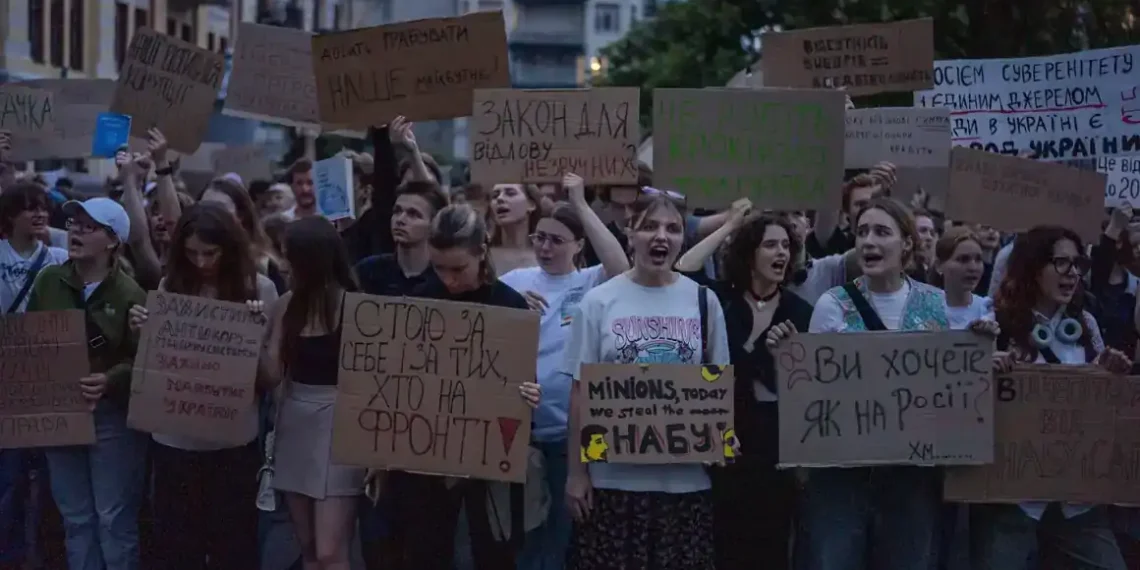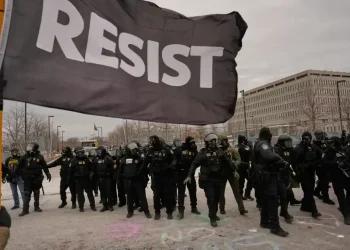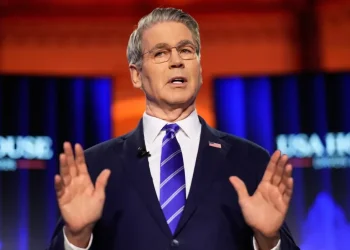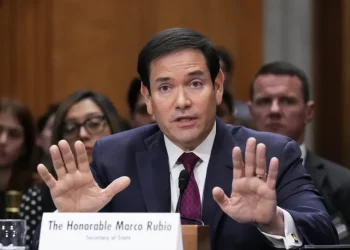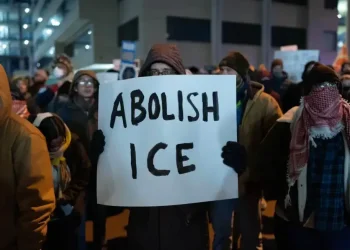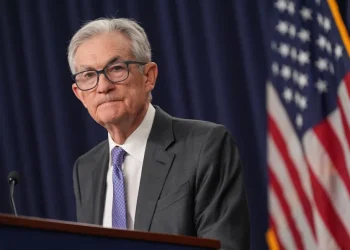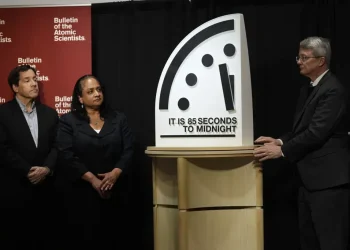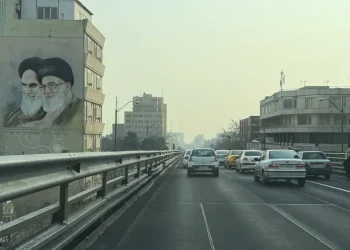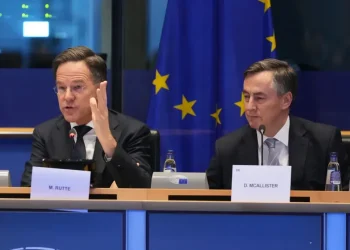Zelenskyy faces protests and EU criticism over anti-corruption law
July 23, 2025 – 4:30 PM
Ukrainian President Volodymyr Zelenskyy is facing growing public backlash after signing a new anti-corruption law that critics say weakens oversight and undermines democracy.
The move triggered Ukraine’s largest anti-government protests since the war began and drew strong rebukes from European Union officials, potentially threatening Ukraine’s bid for EU membership and continued Western aid.
What happened
Thousands of Ukrainians took to the streets this week, outraged by Zelenskyy’s approval of a new law that reshapes the authority of the country’s anti-corruption watchdogs.
Despite public pressure to veto the bill, Zelenskyy signed it, defending the law as a necessary tool to speed up corruption cases and root out what he called “Russian influence.”
“We all hear what society says,” Zelenskyy posted on Telegram, shortly after meeting with Ukraine’s top anti-corruption and security officials. He insisted the new legal framework is needed to deliver faster justice.
“Criminal cases should not drag on for years without verdicts,” Zelenskyy said. “Those working against Ukraine must not feel comfortable or immune from punishment.”
A joint action plan from the government is expected within two weeks, aimed at strengthening institutions, removing legal loopholes, and ensuring fair trials.
What the new law changes
The law gives Ukraine’s Prosecutor General expanded powers over the two key anti-corruption bodies:
- National Anti-Corruption Bureau of Ukraine (NABU)
- Specialized Anti-Corruption Prosecutor’s Office (SAPO)
Critics say this opens the door to political interference.
Prosecutor General Ruslan Kravchenko, a Zelenskyy appointee just one month into the job, said the agencies will continue operating independently.
“The prosecutor general has only been granted broader powers,” Kravchenko said, attempting to reassure the public.
However, watchdog groups like Transparency International Ukraine warn the changes “dismantle” the country’s anti-corruption architecture — progress that took years to build after the 2014 Revolution of Dignity.
Public outcry in wartime
Tuesday’s protests marked the first large-scale demonstration against Zelenskyy since Russia’s full-scale invasion in 2022.
Crowds gathered in central Kyiv and other cities, calling the law a betrayal of democratic values.
Veteran Oleh Symoroz, who lost both legs fighting Russia, said many Ukrainians feel leadership is placing loyalty above justice.
“Those who swore to protect the laws have instead chosen to shield their inner circle,” Symoroz said at the protest.
Despite the ongoing war, the frustration among Ukrainians over corruption remains a powerful political force.
Zelenskyy’s popularity, once sky-high during the early war months, is now under new strain — not from the battlefield, but from internal governance decisions.
EU officials raise concerns
Ukraine’s aspirations to join the European Union could take a hit.
Top EU officials were quick to criticize the law.
German Foreign Minister Johann Wadephul warned,
“Limiting the independence of Ukraine’s anti-corruption agency hampers Ukraine’s way towards the EU.”
EU Defense Commissioner Andrius Kubilius added:
“Trust between the fighting nation and its leadership is more important than modern weapons — and it’s easy to lose.”
Billions of dollars in Western aid depend on Ukraine demonstrating a genuine commitment to reform and transparency.
If the EU believes Ukraine is sliding backward on anti-corruption promises, it could jeopardize future aid and delay its path to membership.
Russia responds, as war continues
While Kyiv dealt with domestic unrest, Russia was quick to exploit the moment.
Though Moscow is battling its own internal corruption scandals, Russian officials took a victory lap over Zelenskyy’s struggles.
Meanwhile, Russian drone strikes knocked out power to over 220,000 residents in Ukraine’s northeastern Sumy region. Zelenskyy said most services were restored within hours.
In Istanbul, Ukrainian and Russian delegations met for the third time in two months, though few expected progress on peace talks.
Zelenskyy reiterated that Ukraine is demanding a full ceasefire and an end to strikes on civilian infrastructure.
U.S. pressure on Russia
In a separate development, former U.S. President Donald Trump warned Russia of heavy sanctions and promised more U.S. weapons, funded by European allies, if Moscow doesn’t agree to a ceasefire by early September.
Trump, who has toughened his stance toward Russian President Vladimir Putin, expressed frustration over what he sees as Russia dragging out the war.
Though not directly related to the protest story, Washington’s position remains key to Ukraine’s future — both on the battlefield and in keeping global support strong.
Why it matters now
This anti-corruption law controversy arrives at a crucial time.
Ukraine is trying to:
- Maintain domestic unity during wartime
- Prove to Western allies that democratic reforms are real
- Keep public trust in its leadership intact
The public backlash suggests that Ukrainians, even while under siege, won’t tolerate backsliding on democratic progress.
And for Zelenskyy — long praised internationally as a symbol of resilience — the road ahead just got more complicated.
Final thoughts
Zelenskyy’s handling of the anti-corruption law could shape Ukraine’s future — both in the eyes of its citizens and the international community.
With war, aid, and EU membership all at stake, the coming weeks will be critical.
Follow us for updates on Ukraine’s political reforms, the ongoing war, and major global reactions. And feel free to share your thoughts in the comments — how should Ukraine balance wartime leadership with democratic transparency?
This article was rewritten by JournosNews.com based on verified reporting from trusted sources. The content has been independently reviewed, fact-checked, and edited for accuracy, neutrality, tone, and global readability in accordance with Google News and AdSense standards.
All opinions, quotes, or statements from contributors, experts, or sourced organizations do not necessarily reflect the views of JournosNews.com. JournosNews.com maintains full editorial independence from any external funders, sponsors, or organizations.
Stay informed with JournosNews.com — your trusted source for verified global reporting and in-depth analysis. Follow us on Google News, BlueSky, and X for real-time updates.
